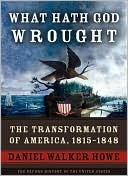The apologetic attitude toward slavery, common around 1815, soon began to be challenged by a new justification for slavery: planter paternalism. In colonial times, masters had candidly and unflinchingly admitted that they owned slaves for profit and that the institution rested upon force. The notion of paternalism provided a framework for discussing slavery different from both naked self-interest and the violation of natural rights. Slaveowners, in response to moral criticism, sought to explain their relationship to “their people” as one of caring for those who could not look after themselves.
...more
Welcome back. Just a moment while we sign you in to your Goodreads account.


